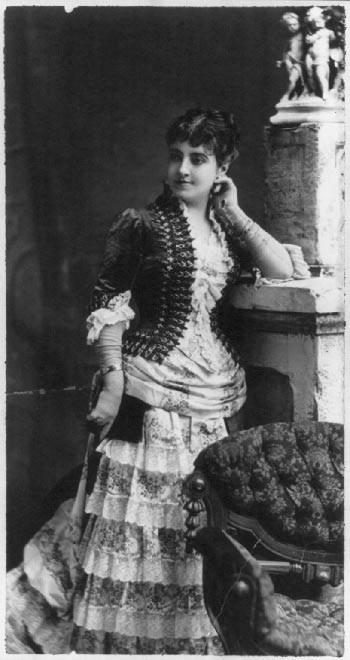
|
For the 1883 American season music agent James Mapelson wanted to beat out a new competing opera company so he dared to bring together two of the most temperamental singers in the world.[1] He would soon find out that his biggest problem was not his competitor, but his two divas[2]. Mapelson already had a big star, Adelina Patti[3]. He kept her with his company by paying her more than $5,000 per performance and providing her with a private railway car[4] that cost $60,000 and included a solid silver bathtub[5] and a key of 18-carat gold. For the new season Mapelson brought in a singer sought by his upstart[6] competitor. She was Etelka Gerster, whom he took to be “a most admirable singer, and a charming woman into the bargain[7].” The strife began in Baltimore when Gerster noticed a playbill with Patti’s name in bigger print than her own and admission prices that were higher than hers.[8] Gerster fled on a train for New York, where Mapelson finally tracked her down and agreed to all of her demands. Then, in Chicago, Mapelson boldly cast both prima donnas[9] in the same opera, The Huguenots. Confusion over bouquets led to Patti receiving most of the floral tributes after an act in which Gerster had done most of the singing.[10] The audience responded by rewarding Gerster with a wild ovation, convincing a hysterical Patti that Mapelson had plotted against her.[11] In St. Louis, Missouri Governor Thomas Crittenden stole a kiss from Patti, of which Gerster said, “There is nothing wrong in a man kissing a woman old enough to be his mother.” Patti went on to San Francisco, where her performance as Violetta in Verdi’s La Traviata caused such a stir[12] that the entire police force had to be called out to protect the theater. A journalist noted, “I doubt if twenty women in the house heard the music in the ballroom[13] scene. La Diva treated the house to a view of as many of her diamonds as she could carry without being brought in on trestles[14].” A few months later the opera war ended when Patti and her husband sailed for Europe, taking with them the comforting proceeds[15] from the contentious American season—fees totaling $250000. And a battered Mapelson took satisfaction in having trounced his competitor, the fledgling Metropolitan Opera.[16] |
1883年,美国季节音乐会代理商詹姆士•梅普森想一举击败他的竞争对手——一家新歌剧公司,为此,他毅然同时推出两位脾气最喜怒无常的歌唱家。不过他很快就会发现,他所面临的最大的问题不是他的竞争对手,而是这两位歌剧女明星。 当时,梅普森旗下已经有一位巨星阿德琳娜•帕蒂。为了把她留在公司,梅普森付给她每场5千多美元的出场费,还为她配备了一个价值6万美元的私人火车包厢,以及一个银制浴缸和一把18克拉的金钥匙。新的演出季即将到来,梅普森为此推出了其竞争对手也想签约的一位歌唱家——埃特尔卡•格斯特尔。梅普森认为她“不仅是一位非常出色的歌唱家,而且还是一位迷人的女性”。 在巴尔的摩,龃龉开始了。格斯特尔发现,印在海报上的帕蒂的名字比自己的名字要大,而且票价也要高一些。于是格斯特尔便乘火车去了纽约,梅普森在那里费尽周折才找到了她,对她的一切要求满口答应。随后在芝加哥,梅普森非常大胆地在歌剧《胡格诺教徒》中同时启用了这两位女歌唱家。在一幕由格斯特尔担任主唱的歌剧演出结束后,由于混乱,更多的鲜花却都献给了帕蒂。观众对格斯特尔的演唱报以热烈的欢呼,这让歇斯底里的帕蒂觉得梅普森在暗地里和自己作对。在圣路易斯,密苏里州的州长偷吻了帕蒂,对此格斯特尔冷言冷语:“亲吻一个和自己母亲年龄相仿的女人并不为过。” 随后,帕蒂又去了旧金山,在那里她饰演了威蒂尔创作的歌剧《茶花女》中的维奥莱塔,引起了极大的骚动,不得不招来全体警察维持剧院安全。一位记者评论道:“我怀疑能够听清舞会那场戏的女人有没有20个。这位女主角差不多把她所有的钻石都带来了,就差展示架了,剧院成了她恣意展示私人首饰的场所。” 几个月后,这场歌剧之争结束了。帕蒂和丈夫乘船去了欧洲,还带去了这个演出季赚得的丰厚收入——总计达25万美元的演出费。精疲力竭的梅普森也感到很满意,因为他击败了竞争对手——初出茅庐的“大都会歌剧院”。 (来源:英语学习杂志) |
|
Vocabulary: 1. beat out: 击溃;temperamental: 喜怒无常的。 2. diva: (歌剧的)女主角。 3. Adelina Patti: 阿德琳娜•帕蒂(1843—1919),意大利著名女高音歌唱家,被公认为声乐史上自1861年到1906年近50年间最伟大的女高音歌唱家。 4. railway car: 火车包厢。 5. bathtub: 浴缸。 6. upstart: 新崛起的。 7. into the bargain: 除此之外。 8. strife: 争斗,不和;playbill: 节目单,演出海报。 9. prima donna: 首席女演员。 10. bouquet: 花束,恭维话;floral: 花的。 11. ovation: 欢呼;hysterical: 歇斯底里的。 12. stir: 轰动,骚动。 13. ballroom: 跳舞的大厅。 14. trestle: 支架。 15. proceeds: 收益。 16. battered: 憔悴的;trounce: 击溃;fledgling: 初出茅庐的;metropolitan: 大都会。 |